
Quickly to the right hardware equipment …
ASRock X299 Taichi XE Layout, Design and Features
ASRock X299 Taichi XE Equipment and other features
ASRock X299 Taichi XE Expansion cards
ASRock X299 Taichi XE Memory
ASRock X299 Taichi XE Hard disk drive connectors
ASRock X299 Taichi XE USB and Firewire
ASRock X299 Taichi XE Network
ASRock X299 Taichi XE Sound
ASRock X299 Taichi XE ATX back panel connectors
ASRock X299 Taichi XE PC System
Layout, Design and Features …
As already explained in the unboxing video on our OCinside YouTube Channel, the X299 board and of course also the new X299 XE version is designed for the latest Intel LGA 2066 Skylake-X and Kabylake-X processors.
Here is the ASRock X299 Taichi without XE unboxing video (English subtitles):
Note: Please allow our cookies first to see this external content!
Here you can see the nice motherboard box of the new ASRock X299 Taichi XE motherboard with the prominent XE in the middle of the box.
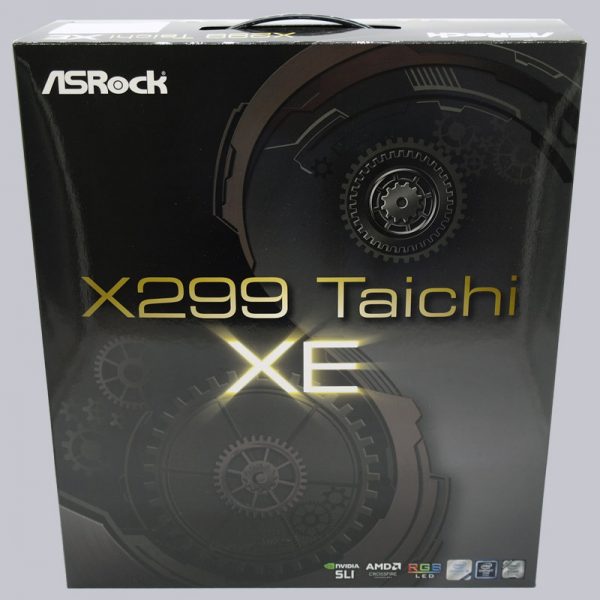
On the back of the packaging you can already see some features like for example WiFi, Dual LAN, 13 Phase Power, BIOS Flashback, USB 3.1 Gen2, Intel Optane support, Hyper BCLK Engine II, 8-Layer PCB, Aura RGB LED and Triple Ultra M.2 Slots.
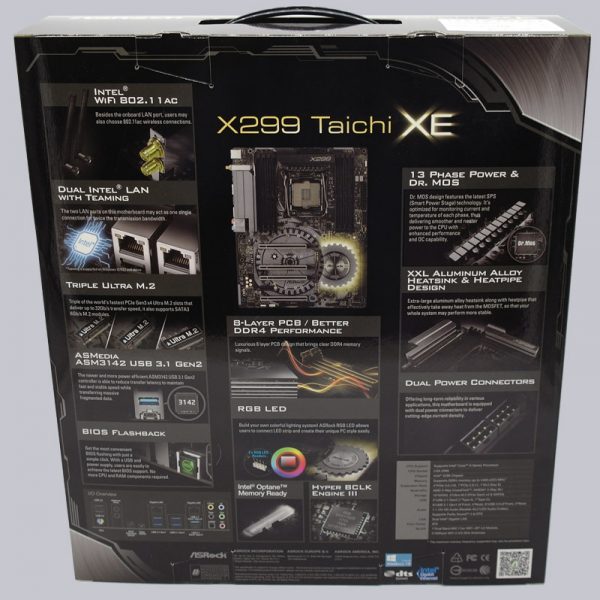
After removing and opening the box we can have a look at the contents.
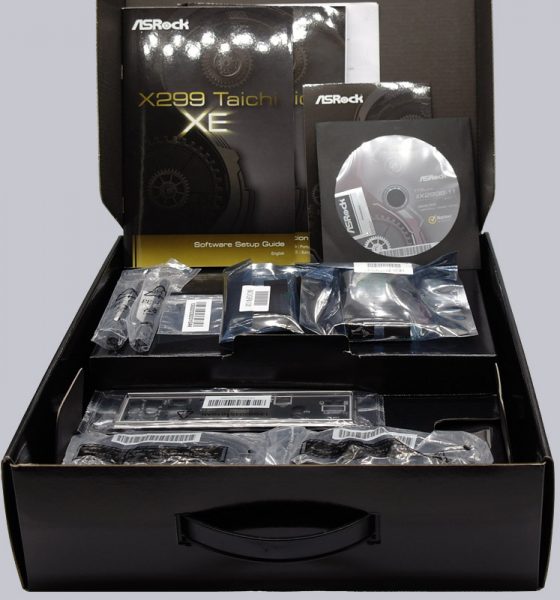
As most high-quality ASRock motherboards, the X299 Taichi XE is bordered in foam for safe transport.
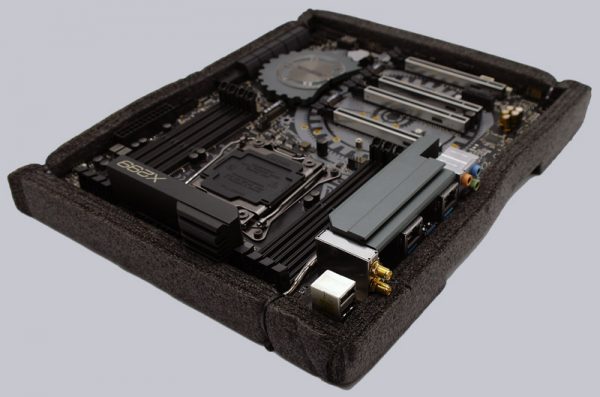
The ASRock X299 Taichi XE High Density fiber glass Sapphire Black PCB looks as good as the previously tested ASRock X299 Taichi motherboard. It also features very durable Nichicon 12K Black Caps, Premium 65A Power Chokes, 13 Power Phase Design, Digi Power, Dual-Stack MOSFET and 7.1 HD Purity Sound 4 over ALC1220 with Nichicon Fine Gold Audio capacitors, 120dB SNR DAC and TI NE5532 headset amplifier.
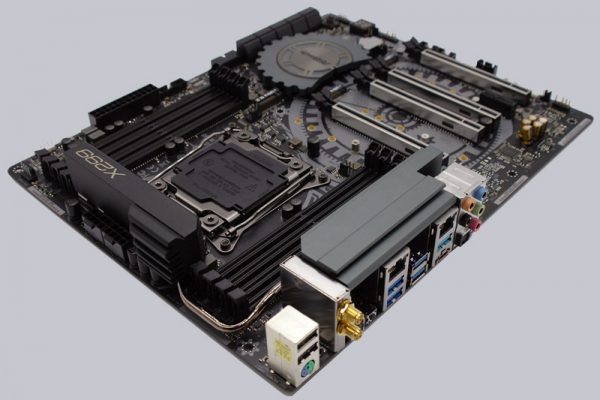
The ASRock X299 Taichi XE has a Dr. Debug 7-segment LED postcode display and also offers three! fast Ultra M.2 slots for PCIe Gen3 x4 modules with up to 32 Gb/sec. bandwidth. The picture shows the new PCIe Steel slot and the three Ultra M.2 sockets, which can be equipped with 2230/2242/2260/2280 M.2 modules as well as one longer 22110 M.2 module.
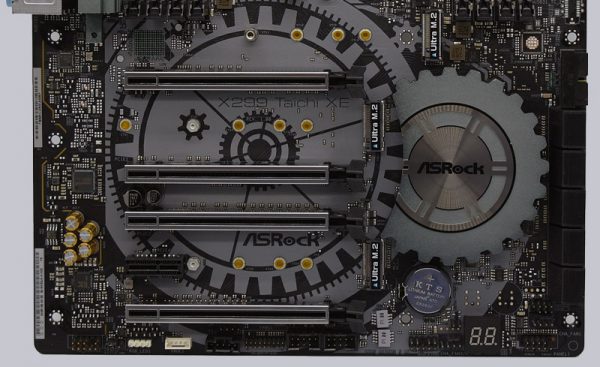
We tested the X299 Taichi XE with a Plextor M8SeGN 512GB M.2 NVMe SSD.
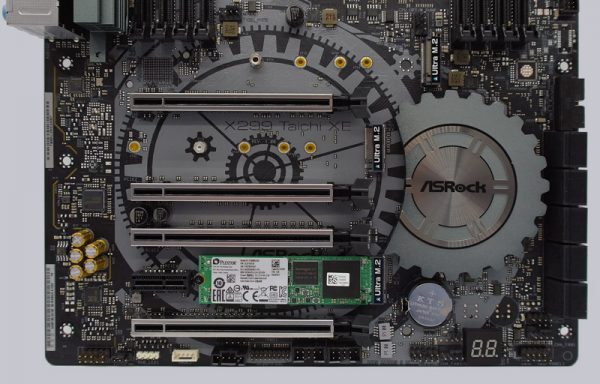
Conventional RGB stripes can be connected to the white 4-pin 12V RGB headers, for example to illuminate the chassis. The X299 Taichi XE has a second 12V RGB LED connector like the X299 Taichi.
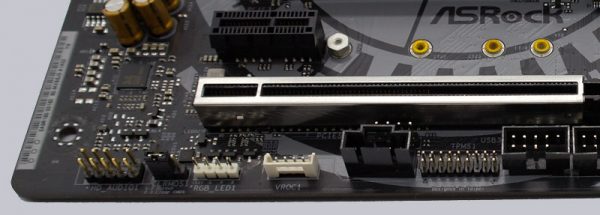
ASRock has integrated the RGB LEDs on the X299 Taichi XE underneath the chipset cooler, which can be controlled as desired.
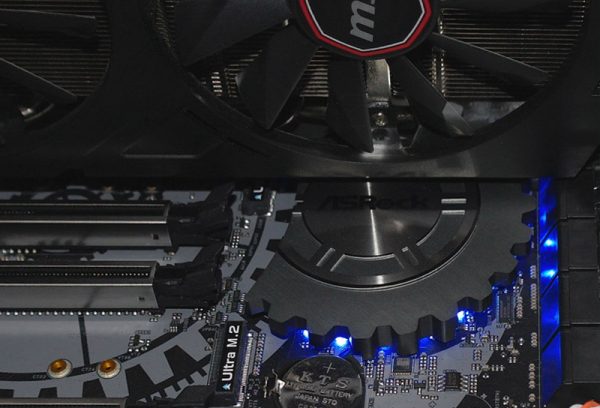
The RGB headers and the integrated RGB LEDs are controlled by the supplied ASRock RGB LED software. As with the ASRock Z270 motherboards, all settings can be made graphically via the UEFI. For example, in the ASRock RGB LED software or in the BIOS you can select the colors in an RGB color selector. You can also set whether the RGB headers should be controlled separately or together with the RGB lighting under the chipset cooler. And you can select in the ASRock RGB LED menu whether the LEDs should be lit continuously, breathing, randomly or controlled to music. This gives the user numerous possibilities of how and how fast the LED strips or the chipset cooler should light up and can of course also completely deactivate the lighting.
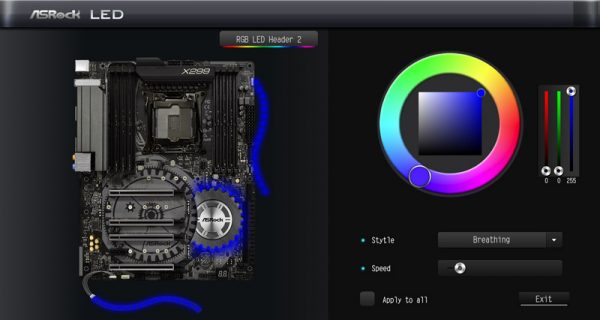
Here you can see one of the two internal USB3.1 Gen1 ports, the 24-Pin ATX power connector, some of the high quality Nichicon 12K Black Caps capacitors, as well as a second RGB Header.
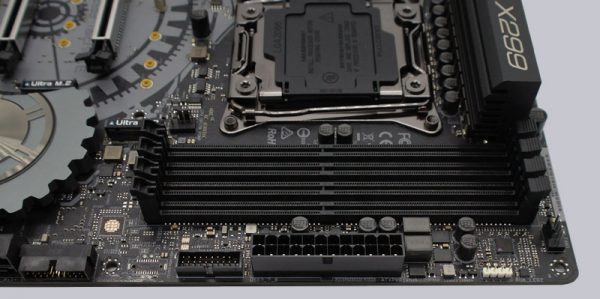
Now we come to the big difference that the ASRock X299 Taichi XE makes to the ASRock X299 Taichi. The picture shows the side view of the motherboard with the large XXL aluminum alloy heatsink, which has been carefully mounted on the MOSFETs.

Here you can see the ASRock X299 Taichi XE above and the ASRock X299 Taichi below. The different design of the I/O panel cover, which was fitted with a second heat sink connected to the VR heat sink by means of a heat pipe, is quickly recognizable.
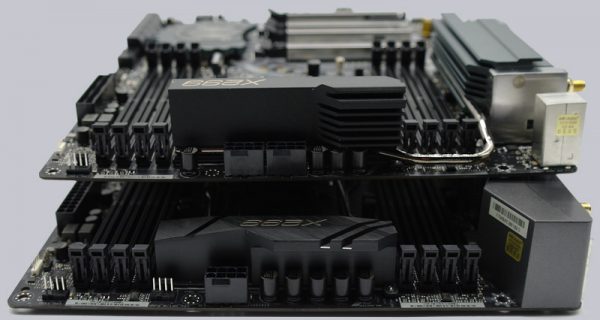
Of course, we also removed the heat sink of the ASRock X299 Taichi XE to show what exactly is being cooled: The so-called Smart Power Stage, i.e. all 12+1 60A MOSFETs including the 65A Power Chokes.
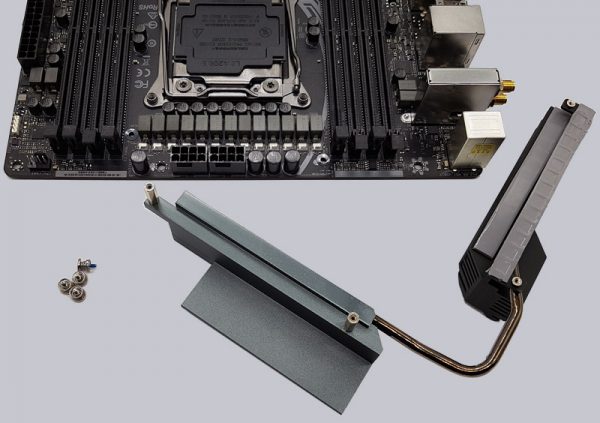
In comparison you can see the disassembled MOSFET radiator of the ASRock X299 Taichi without XE.
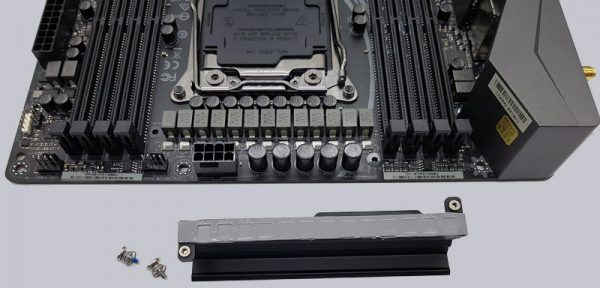
On the following picture you can see a further difference between the ASRock X299 Taichi and X299 Taichi XE without the heat sinks and this is the Dual Power Connector, two 8-pin 12V power supply connectors.
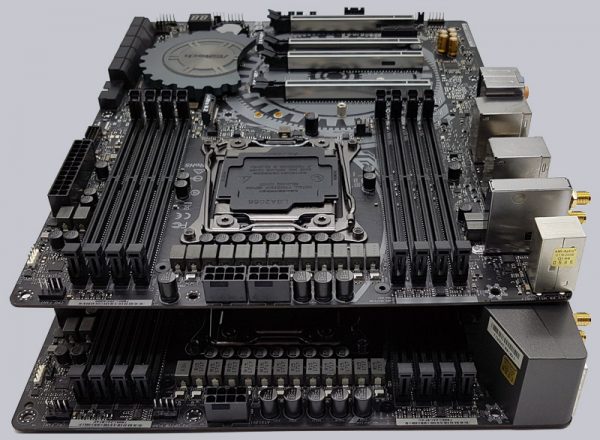
BTW. the same MOSFETs and coils were used on both motherboards. In our opinion there is no need for any improvement of them, because the 13 phases (12+1) deliver up to 720 Ampere!. Extremely good cooling is of course essential for such a performance and this is what ASRock has improved. There is also an internal load and temperature protection. The effects of the new cooling at such a load are shown below using the ASRock X299 Taichi XE test system thermal images.
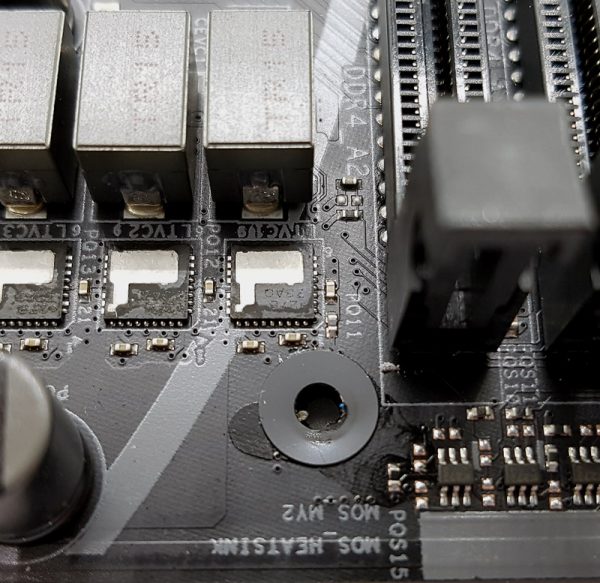
Equipment and other features …
The X299 Taichi XE motherboard from ASRock came with a manual, software setup manual, DVD, four SATA data cables (angled and straight), an ASRock 3-Way SLI-2S1S Bridge card, one ASRock SLI_HB_Bridge_2S card, three screws for the M.2 sockets, two ASRock WiFi 2.4/5 GHz antennas and an ATX I/O cover. Additional USB slot covers or ASRock USB 3.0 front panel are available optional.
The ASRock X299 Taichi XE offers a lot of features like the ASRock A-Tuning Tool, ASRock Instant Flash, ASRock Internet Flash, ASRock Easy RAID Installer, 13 Power Phase Design, Digi Power, ASRock RGB LED, ASRock FAN-Tastic Tuning and the ASRock BIOS Flashback Switch as shown in our Unboxing Video.
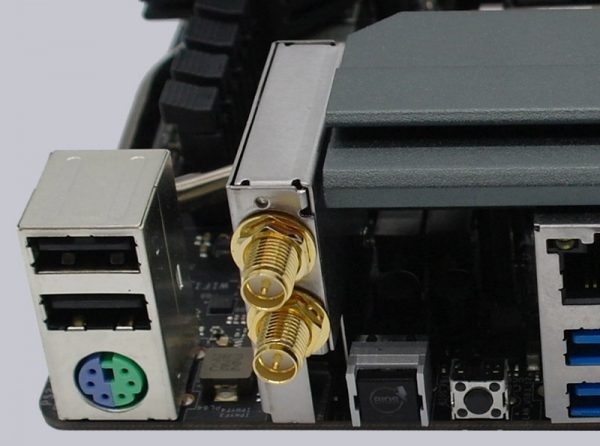
Expansion cards …
The motherboard offers four PCI Express 3.0 x16 slots for AMD CrossFireX or nVidia SLI, of which either one or two graphics cards with x16 bandwidth can be connected, or even two graphics cards with x16 bandwidth and one additional graphics cards with x8 bandwidth. In addition to the four PCI Express 3.0 slots, there is also a PCI Express 2.0 x1 slot.
Memory …
The ASRock X299 Taichi XE can be equipped with up to eight DDR4 modules and is expandable depending upon operating system used (see list) up to maximally 128 GB memory.
Here you can see a picture of the eight DDR4 memory slots with Quad Channel support:
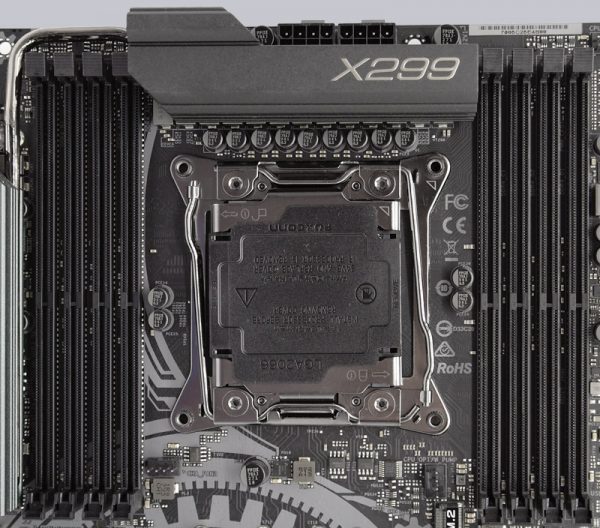
The Intel LGA2066 motherboard supports DDR4 memory modules and can be optimized in the BIOS with an Intel Skylake-X processor for DDR4-2666 Quad Channel modules. The UEFI offers the selection from DDR4-1200 up to DDR4-4400. Higher clock-rates are possible with BCLK overclocking.
Thanks to XMP support (Extreme Memory Profiles), XMP memory modules are set correctly with one mouse click in the UEFI and of course there are far more memory adjustments and more OC-options, but more on that later. Before buying the RAM, you should check the officially supported RAM modules at the ASRock memory support page.
Hard disk drive connectors …
The ASRock X299 Taichi XE offers a total of ten angled SATA3 ports, two of them by the ASMedia ASM1061 chip.

The SATA3 ports are supporting RAID 0, RAID 1, RAID 5, RAID 10, NCQ, AHCI and the Hot Plug function in AHCI mode (AHCI stands for Advanced Host Controller Interface and can/should be selected in the UEFI, especially when using SSDs). Thanks to the UEFI BIOS also drives with more than 2 TB for the installation of Windows 10, Windows 8.1 or Windows 7 x64 can be installed. The drivers were installed in Windows 10 without any problems, so the Windows 10 installation was done quickly. But even Windows 7 could be installed without any problems.
The RAID drivers can be installed via the Easy RAID Installer point in the UEFI, are supplied on DVD for 32-bit / 64-bit Windows 7, Windows 8 and Windows 10 and are currently available for download on the ASRock support page, whereby the Windows 10 installation is currently preferred.
USB and FireWire …
The ASRock X299 Taichi XE ATX panel has four USB 3.0 Type-C ports (USB 3.1 Gen1), two USB 2.0 ports and two USB 3.1 Gen2 ports. The picture shows the USB 3.1 Type-A in the middle and an USB 3.1 Type-C at the bottom (can be inserted in both directions).
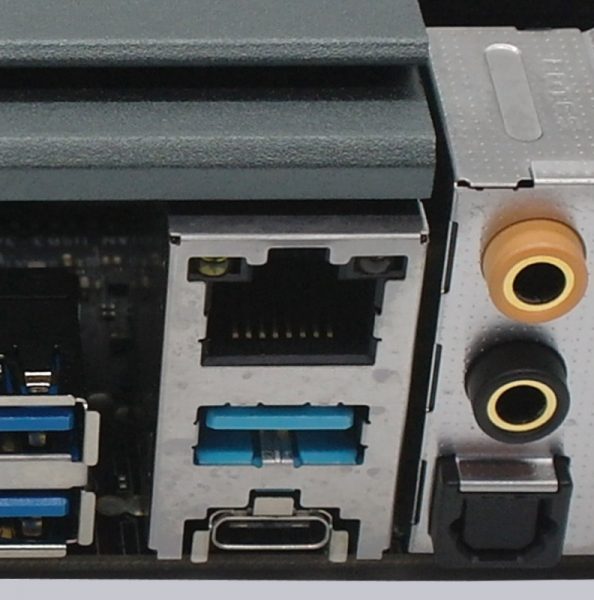
Internally, two more USB 2.0 connectors are available for up to four optional USB 2.0 ports, as well as two USB 3.0 connectors for up to four optional USB 3.0 ports (USB 3.1 Gen1). The 20-pin connector can be connected either to an optional USB3.1 Gen1 front panel or to an enclosure with USB3.1 Gen1 support.
Network …
The ASRock X299 Taichi XE has been equipped with an Intel I211AT and an Intel I219V, through which the 10/100/1000 network ports are realized on the ATX panel. The LAN ports are WoL-capable, offer LAN cable detection, support energy efficient Ethernet according to the 802.3az standard, PXE and more. Additionally the ASRock X299 Taichi XE has onboard WLAN 2,4/5 GHz IEEE 802.11a/b/g/n/ac with up to 433 Mbps transfer rate as well as Bluetooth 4.2/3.0 + High Speed Class II.
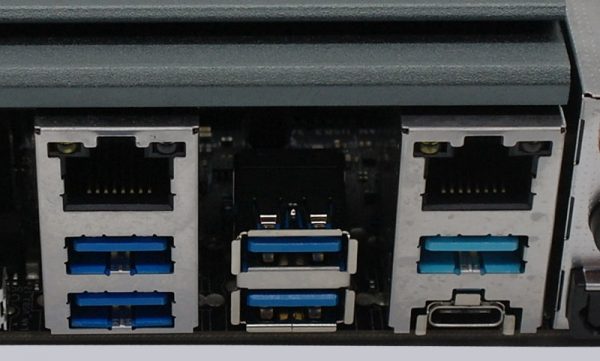
Sound …
The ASRock X299 Taichi XE motherboard is equipped with the ALC1220 audio codec with content protection, 120dB SNR DAC, TI NE5532 Premium Headset Amplifier and Purity Sound 4, which supports 7.1 surround sound at the internal front panel audio connector and has analog output over 5x 3.5mm connectors on the ATX panel. Additionally, there is an optical SPDIF digital output and premium Blu-Ray audio support. So most users do not need to buy an additional sound card with digital outputs.
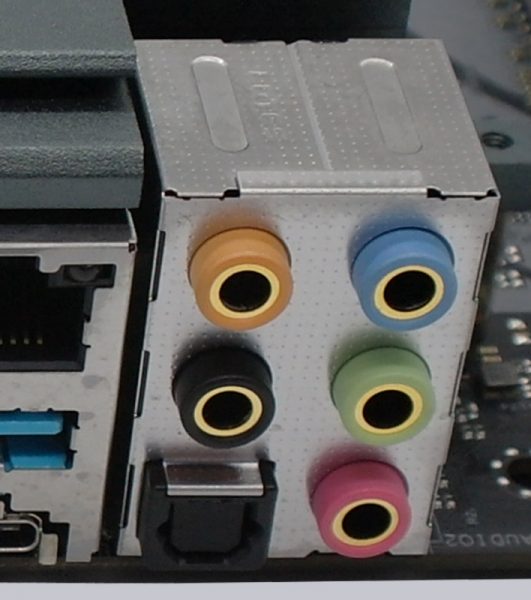
ATX back panel connectors …
From left to right you can see 1x PS/2 connector for PS/2 keyboard or PS/2 mouse and 2x USB 2.0, Clear CMOS button, two WiFi antenna connectors, the ASRock BIOS flashback button, Clear CMOS button, RJ45 Gigabit LAN and 2x USB 3.0, 2x USB 3.0, RJ45 Gigabit LAN and 1x USB 3.1 type-A port and 1x USB 3.1 type-C port and optical SPDIF output as well as 5x 3.5mm jacks for the sound.

Test System …
Now we come to the Intel LGA 2066 CPU socket, which we have equipped with an Intel Core i9-7900X CPU. The socket has again been fitted with two levers that are pressed one after the other to press the CPU evenly onto the pins in the socket. As always, never touch or even bend the contacts.
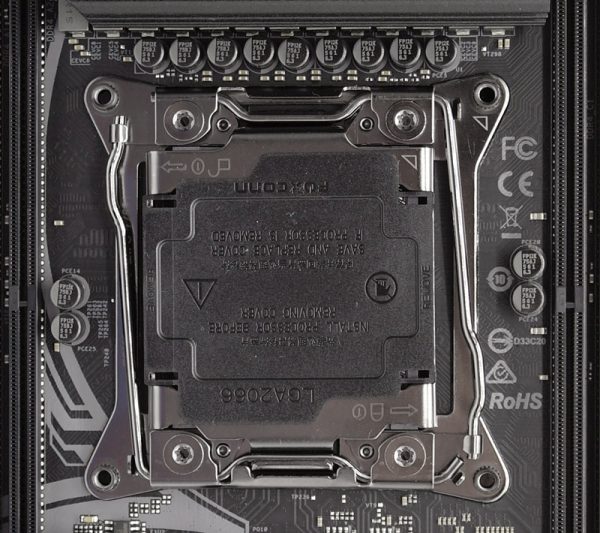
Here you can see the four DDR4 modules from Crucial in the ASRock X299 Taichi XE motherboard. In order to offer the Intel LGA 2066 CPU a high memory throughput, we have installed four Ballistix Sport DDR4 2666 16 GB BLS16G4D26BFSB modules.
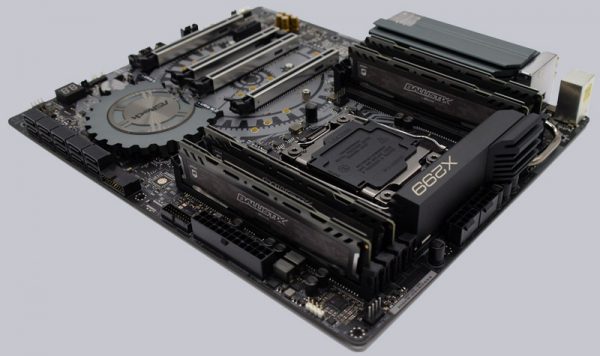
Intel Skylake-X with 28 or 55 PCIe Lanes processors support the Quad Channel Mode, Intel processors with 16 PCIe Lanes only support the Dual Channel Mode. Four of the eight possible memory modules are used on the Intel X299 motherboard to get Quad Channel support with the Intel Core i9-7900X CPU.
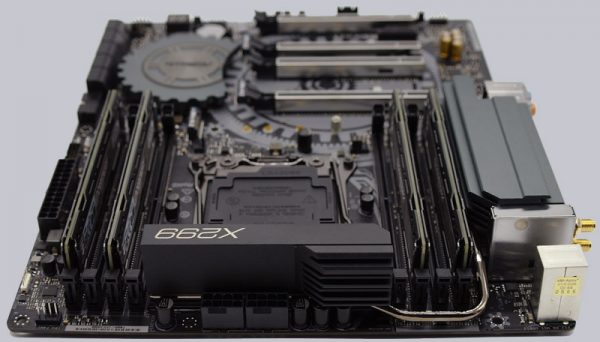
For the previous threadripper ASRock X399 Taichi motherboard review we ordered the Arctic Freezer 33 TR Cooler from ARCTIC, which is also suitable for the Intel LGA 2066 processors.
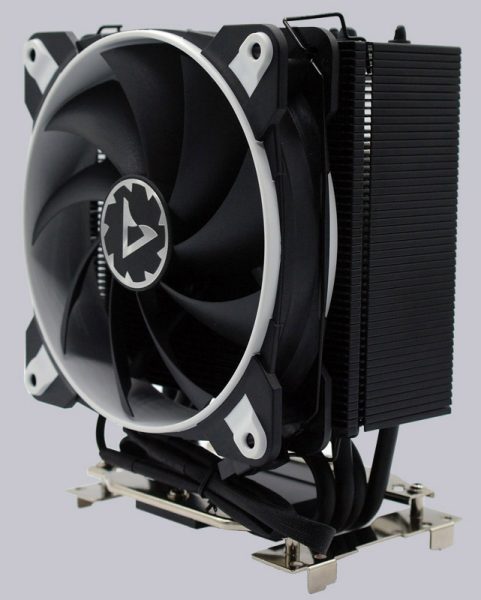
Here you can see the Intel LGA 2066 test system including Arctic Freezer 33 TR cooler, MSI Radeon R9 280 graphics card and Icy Dock MB171SP-B Turbo Swap Swap change frame for quick replacement of the SSD and HDD.
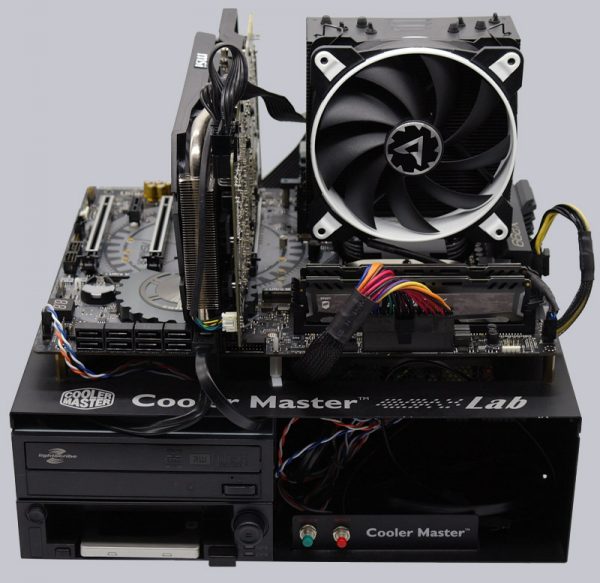
This is how the 10-core (20 threads) of the Intel Core i9-7900X CPU in the Windows 7 task manager at Prime95 full load look like.
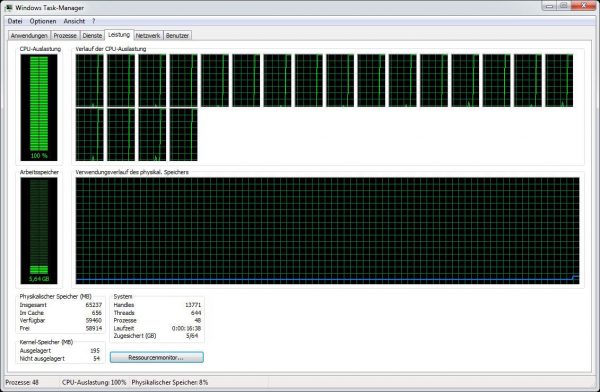
Now let’s get back to the differences between the Non-XE and the XE motherboard. The following thermal image shows the MOSFET cooler of the ASRock X299 Taichi motherboard.
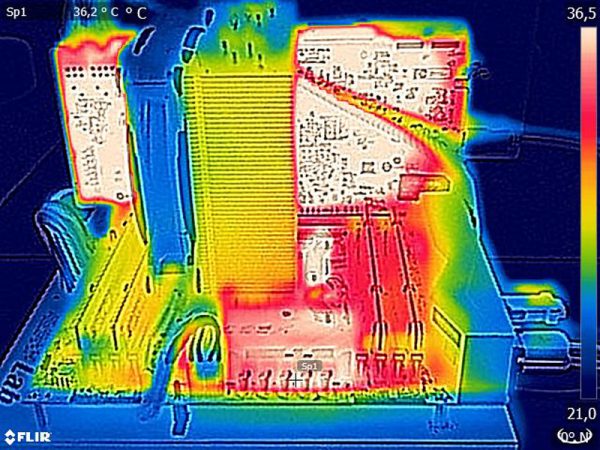
Here, ASRock was able to significantly improve the heat distribution. As you can see on the thermal image of the ASRock X299 Taichi XE PC system, the heat from the voltage regulators and coils is transferred via heatpipe to the second MOSFET heat sink via the I/O panel, thus ensuring better heat dissipation.
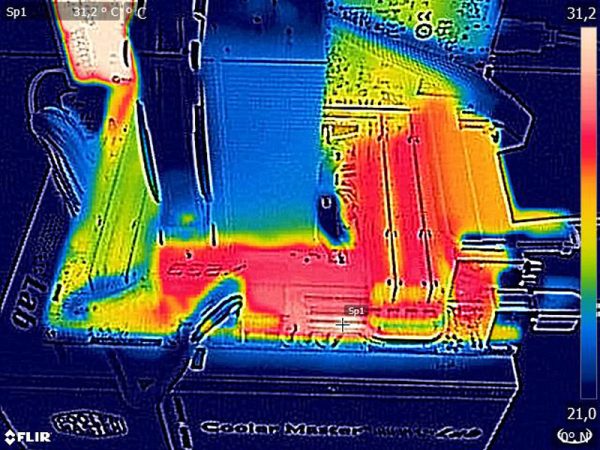
ASRock X299 Taichi XE BIOS and Overclocking …

